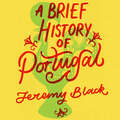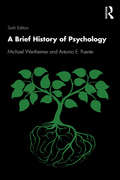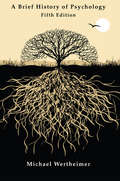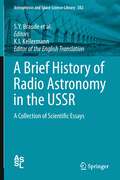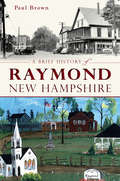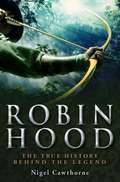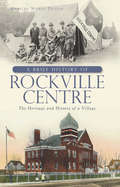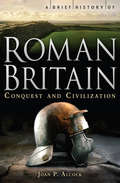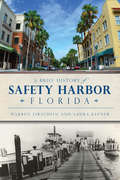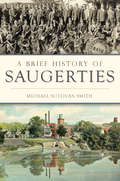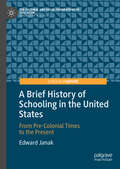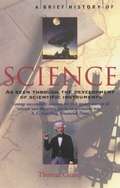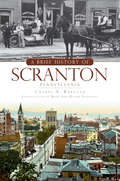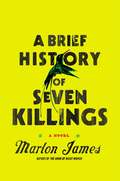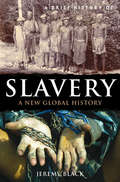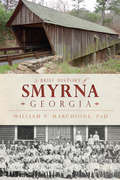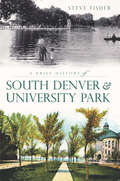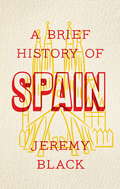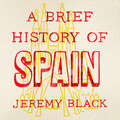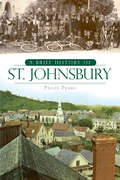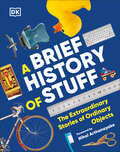- Table View
- List View
A Brief History of Portugal: Indispensable for Travellers
by Jeremy BlackThis is a comprehensive history of Portugal that covers the whole span, from the Stone Age to today. An introduction provides an understanding of geographical and climatic issues, before an examination of Portugal's prehistory and classical Portugal, from the Stone Age to the end of the the Roman era.Portugal's history from ad420 to the thirteenth century takes in the Suevi, Visigoths and Moors. Then, a look at medieval Portugal, covers the development of Christian Portugal culminating with the expulsion of the Moors, with a focus on key sites. A subsequent section on Spanish rule, between 1580 and 1640, explains why Spain took over and why Spanish rule collapsed.There is a significant focus on Portugal's global role, particularly during the age of exploration, or expansion, in the fifteenth century to 1580: Manueline Portugal, Henry the Navigator, Vasco da Gama and Belém. Portugal was the first of the Atlantic empires, with territory in the Azores, Madeira, West Africa and Brazil, and it remained a major empire until the 1820s, retaining an African empire until the 1970s. It's empire in Asia - in Malacca, Macao, Goa and Timor - continued even longer, until the 1990s. Black shows how Portugal had a global impact, but the world, too, had an impact on Portugal. Baroque Portugal, between 1640 and 1800, is explored through palaces in Mafra, Pombal and elsewhere and the wealth of Brazil. The nineteenth century brought turmoil in the form of a French invasion, the Peninsular War, Brazilian independence, successive revolutions, economic issues and the end of the monarchy.Republican Portugal brought further chaos in the early years of the twentieth century, then the dictatorship of Salazar and its end in the Carnation Revolution of 1974. Portugal's role in both world wars is examined, also its wars in Africa. From the overthrow of autocracy to a new constitution and the leadership of Soares, contemporary, democratic Portugal is explored, including the fiscal crisis of recent years. Throughout Black introduces the history and character of the country's principal regions, including the Azores, Madeira and the Cape Verde Islands. He looks at key national sites, at Portuguese food and wine and the arts, with special sections devoted to port, Portugal's famous tiles and the university established at Coimbra in 1290.
A Brief History of Psychology
by Michael Wertheimer Antonio E. PuenteThis brief, inexpensive text offers great flexibility in teaching the history of psychology. Used as a stand-alone text or with readers, this engaging book is noted for its analysis of the scientific and philosophical emergence of the field as well as its coverage of contemporary psychology and emerging areas. Readers appreciate the book's balanced coverage of experimental, applied, and clinical psychology, as well as the clear and succinct presentation of the field's major events and schools of thought. The sixth edition features an expanded pedagogical program with bolded terms, a complete glossary, more illustrations, and web-based instructional materials including PowerPoints, a test bank, discussion questions, and more. Special emphasis has also been placed on the role of the American Psychological Association (APA) in the history of psychology.Extensively updated throughout, the sixth edition features: A revised final chapter with a current analysis of the state of the field, including the growth of the APA as well as specialized organizations that promote the science and profession of psychology, and the push to influence policies that address global challenges, such as environmental sustainability, intergroup conflict, health disparities, and the population explosion. A discussion of the growth in the number and role of women and ethnic minorities in psychology, and the promotion of diversity across both demographic and intellectual perspectives. Recent developments in the growth of neuroscience, cognitive science, artificial intelligence, and the diversification and internationalization of psychology. Portraits of some major figures in the history of psychology, including psychology’s first Nobel Prize winners. Recent and evolving changes in the practice of psychology, including more emphasis on "evidence-based practice," prescription privileges, and the emergence of the importance of psychological practice in health care. Recent changes in the APA, including new divisions and new elected officials and its emerging focus on advocacy. Used independently or as a supplement with readers, this brief text is intended for undergraduate and graduate courses on the history of psychology. Due to its brevity and engaging style, the book can be used in introductory courses to introduce students to the field. The enormous index and substantial glossary make this volume a useful desk reference for psychology and related disciplines.
A Brief History of Psychology
by Michael WertheimerThis brief, inexpensive text offers the utmost in flexibility in teaching the history of psychology. Used as a stand-alone text or with readers, this engaging book is noted for its analysis of the scientific and philosophical emergence of the field. Readers appreciate the book’s balanced coverage of experimental, applied, and clinical psychology, as well as the clear and succinct presentation of the field’s major events and schools of thought. This edition features an expanded pedagogical program with bolded terms, a complete glossary, more illustrations, and web-based instructional materials including Power Points, a test bank, discussion questions, and more. Extensively updated throughout, this edition features: A new final chapter with a current analysis of the state of the field including the growth of specialized organizations that promote the science of psychology and the push to influence policies that address global challenges such as environmental sustainability, intergroup conflict, health disparities, and the population explosion. A discussion of the growth in the number and role of women in psychology and the promotion of diversity initiatives related to ethnicity, gender, age, and sexual orientation. Recent developments in the growth of neuroscience, cognitive science, and the diversification of psychology. Portraits of some major figures in the history of psychology. Recent changes in the practice of psychology including more emphasis on "evidence-based practice," prescription privileges, and the application of psychological principles to industrial and engineering psychology. Recent changes in the APA including new divisions and new elected officials. Used independently or as a supplement with readers, this brief text is intended for undergraduate and graduate courses on the history of psychology. Due to its brevity and engaging style, the book is often used in introductory courses to introduce students to the field. The enormous index and substantial glossary make this volume a useful desk reference for the entire field.
A Brief History of Radio Astronomy in the USSR: A Collection of Scientific Essays (Astrophysics and Space Science Library #382)
by K. I. Kellermann Yu. N. Pariiskii N. L. Kaidanovskii O. N. Rzhiga I. S. Shklovskii V. A. Samanian N. S. Kardashev R. L. Sorochenko S. Y. Braude A. D. Kuzmin M. M. Kobrin V. S. Troitskii B. A. Dubinskii A. P. Molchanov A. E. SalomonovichThis translation of A Brief History of Radio Astronomy in the USSR makes descriptions of the antennas and instrumentation used in the USSR, the astronomical discoveries, as well as interesting personal backgrounds of many of the early key players in Soviet radio astronomy available in the English language for the first time. This book is a collection of memoirs recounting an interesting but largely still dark era of Soviet astronomy. The arrangement of the essays is determined primarily by the time when radio astronomy studies began at the institutions involved. These include the Lebedev Physical Institute (FIAN), Gorkii State University and the affiliated Physical-Technical Institute (GIFTI), Moscow State University Sternberg Astronomical institute (GAISH) and Space Research Institute (IKI), the Department of Radio Astronomy of the Main Astronomical Observatory in Pulkovo (GAO), Special Astrophysical Observatory (SAO), Byurakan Astrophysical Observatory (BAO), Crimean Astrophysical Observatory, Academy of Sciences of the Ukraine (SSR), Institute of Radio Physics and Electronics of the USSR Academy of Sciences (IRE), Institute of Terrestrial Magnetism, the Ionosphere and Radio-Wave Propagation Institute (IZMIRAN), Siberian Institute of Terrestrial Magnetism, the Ionosphere and Radio-Wave Propagation (SibIZMIRAN), the Radio Astrophysical Observatory of the Latvian Academy of Sciences and Leningrad State University. A Brief History of Radio Astronomy in the USSR is a fascinating source of information on a past era of scientific culture and fields of research including the Soviet SETI activities. Anyone interested in the recent history of science will enjoy reading this volume.
A Brief History of Raymond, New Hampshire (Brief History)
by Paul BrownScenic sites and a proud community make Raymond the bucolic New Hampshire town it is today. The local cast of characters has its own unique story set in the heart of the Granite State. Local author Paul Brown has mined 250 years of town history, from the early settlement to the post-World War II boom. Search for the truth behind the conflicting stories of how the original Freetown became known as Raymond. Meet legendary locals like Dudley Tucker and dig into local legends like the mystery of Scud Lyman. The stories behind the Great White Rock and even Clint Eastwood connections color the history of Raymond. Join Paul Brown as he charts the remarkable course of Raymond history.
A Brief History of Robin Hood
by Nigel CawthorneWho was Robin Hood? Throughout history the figures of the hooded man of Sherwood forest and his band of outlaws have transfixed readers and viewers; but where does the myth come from? The story appeared out of the legend of the Green man but found its location during the reign of Richard II, the Lionheart, who was away from England fighting in the crusades. In his absence his brother John lay waste to the country. But does this tell the full story? Was Robin a bandit prince ahead of a troop of brigands? Who was the Sherrif and was he in fact the legitimate law in the land fighting vigilantes?
A Brief History of Robin Hood (Brief Histories)
by Nigel CawthorneWho was Robin Hood? Throughout history the figures of the hooded man of Sherwood forest and his band of outlaws have transfixed readers and viewers; but where does the myth come from? The story appeared out of the legend of the Green man but found its location during the reign of Richard II, the Lionheart, who was away from England fighting in the crusades. In his absence his brother John lay waste to the country. But does this tell the full story? Was Robin a bandit prince ahead of a troop of brigands? Who was the Sherrif and was he in fact the legitimate law in the land fighting vigilantes?
A Brief History of Rockville Centre: The History and Heritage of a Village
by Marilyn Nunes DevlinThe village of Rockville Centre is a suburban haven on Long Island. Beginning in the eighteenth century with families like the DeMotts, this small farming community quickly grew. Ship captains left their families here while they sailed, and the arrival of the South Shore Railroad brought the wealthy from New York City. Residents established churches, schools, restaurants, newspapers, hotels and shops. Some of these, like the English Evangelical Lutheran Church of the Holy Trinity and the Fortnightly Women's Club, are still part of Rockville Centre's vibrant community. As the village continues to grow, the legacy of its past preserves its tight knit atmosphere. Local author Marilyn Devlin presents Rockville Centre's unique history in these pages.
A Brief History of Roman Britain
by Joan P. AlcockIn BC 55 Julius Caesar came, saw, conquered and then left. It was not until AD 43 that the Emperor Claudius crossed the channel and made Britain the western outpost of the Roman Empire that would span from the Scottish border to Persia. For the next 400 years the island would be transformed. Within that period would see the rise of Londinium, almost immediately burnt to the ground in 60 AD by Boudicca; Hadrian's Wall which was constructed in 112 AD to keep the northern tribes at bay as well as the birth of the Emperor Constantine in third century York. Interwoven with the historical narrative is a social history of the period showing how roman society grew in Britain.
A Brief History of Roman Britain (Brief Histories)
by Joan P. AlcockIn BC 55 Julius Caesar came, saw, conquered and then left. It was not until AD 43 that the Emperor Claudius crossed the channel and made Britain the western outpost of the Roman Empire that would span from the Scottish border to Persia. For the next 400 years the island would be transformed. Within that period would see the rise of Londinium, almost immediately burnt to the ground in 60 AD by Boudicca; Hadrian's Wall which was constructed in 112 AD to keep the northern tribes at bay as well as the birth of the Emperor Constantine in third century York. Interwoven with the historical narrative is a social history of the period showing how roman society grew in Britain.
A Brief History of Safety Harbor, Florida
by Warren Firschein Laura KepnerAccording to legend, Spanish explorer Hernando de Soto arrived on the shores of Safety Harbor in 1539 believing that he had discovered the fabled Fountain of Youth. For centuries, the area's natural mineral springs had hosted the Tocobaga people and would later attract early pioneers to west-central Florida. The natural mineral springs drew visitors to bathe in their restorative waters, and in the twentieth century, they were eventually transformed into the world-famous Safety Harbor Resort and Spa, enjoyed by wealthy socialites and professional athletes for decades. Today, the city is best known for its abundance of festivals and the collection of artists, writers, poets and musicians who call it their home--an oasis of calm within bustling Pinellas County. Join authors Warren Firschein and Laura Kepner as they detail the vibrant history of scenic Safety Harbor.
A Brief History of Saugerties (Brief History)
by Michael Sullivan SmithBeginning as a Dutch settlement, Saugerties is scenically positioned between the Hudson River and the base of the Catskills. In 1609, the great explorer Henry Hudson's first mate, Robert Juet, recorded a meeting with Native Americans in the area. In its early days, the land was part of the Kingston Commons, one of the first municipalities in the colonies to be governed by an elected body. The town's history was shaped by industry. In the nineteenth century, bluestone quarries and paper and lead mills drove its economy, and a century later, Saugerties became a commuter town for IBM's plants. Michael Sullivan Smith chronicles the rich history of Saugerties.
A Brief History of Schooling in the United States: From Pre-Colonial Times to the Present (The Cultural and Social Foundations of Education)
by Edward JanakThis book presents a sweeping overview of the historical and philosophical foundations of schooling in the United States. Beginning with education among the indigenous peoples of the Americas and going on to explore European models of schooling brought into the United States by European colonists, the author carefully traces the arc of educational reform through major episodes of the nation’s history. In doing so, Janak establishes links between schools, politics, and society to help readers understand the forces impacting educational policy from its earliest conception to the modern day. Chapters focus on the philosophical, political, and social concepts that shaped schooling of dominant and subcultures in the United States in each period. Far from being merely concerned with theoretical foundations, each chapter also presents a snapshot of the “nuts and bolts” of schooling during each period, examining issues such as pedagogical devices, physical plants, curricular decisions, and funding patterns.
A Brief History of Science (Brief History of Ser.)
by Thomas CrumpAn exploration of scientific advances throughout time. From earliest pre-history, with the dawning understanding of fire and its many uses, up to the astonishing advances of the 21st century, Thomas Crump traces the increasingly sophisticated means employed in our attempts to understand the universe. The result is an account of how our curious nature has continually pushed forward the frontiers of science and, as a consequence, human civilization.
A Brief History of Scranton, Pennsylvania (Brief History)
by Cheryl A. KashubaThe intense heat of the steel mills and the clatter of coal-filledlocomotives once filled the streets of Scranton, Pennsylvania. Hardworking immigrants, iron rails, and anthracite coal from beneath the surface of the lush Lackawanna River Valley poweredAmerica's Industrial Revolution, and until World War II, the city reigned as a cutting-edge boomtown. Local journalist Cheryl A. Kashuba chronicles the history of Scranton from the glory days of the Lackawanna Iron and Coal Company and the Dickson Works through the post-Industrial decline and an eventual revitalization of the city. With a deft hand, Kashuba captures the spirit of a proud community and creates a fascinating portrait of the Electric City.
A Brief History of Seven Killings
by Marlon JamesIn A Brief History of Seven Killings, Marlon James combines brilliant storytelling with his unrivaled skills of characterization and meticulous eye for detail to forge an enthralling novel of dazzling ambition and scope.<P> On December 3, 1976, just before the Jamaican general election and two days before Bob Marley was to play the Smile Jamaica Concert to ease political tensions in Kingston, seven gunmen stormed the singer’s house, machine guns blazing. The attack wounded Marley, his wife, and his manager, and injured several others. Little was officially released about the gunmen, but much has been whispered, gossiped and sung about in the streets of West Kingston. Rumors abound regarding the assassins’ fates, and there are suspicions that the attack was politically motivated.<P> A Brief History of Seven Killings delves deep into that dangerous and unstable time in Jamaica’s history and beyond. James deftly chronicles the lives of a host of unforgettable characters – gunmen, drug dealers, one-night stands, CIA agents, even ghosts – over the course of thirty years as they roam the streets of 1970s Kingston, dominate the crack houses of 1980s New York, and ultimately reemerge into the radically altered Jamaica of the 1990s. Along the way, they learn that evil does indeed cast long shadows, that justice and retribution are inextricably linked, and that no one can truly escape his fate.<P> Gripping and inventive, shocking and irresistible, A Brief History of Seven Killings is a mesmerizing modern classic of power, mystery, and insight.<P> Winner of the 2015 Man Booker Prize
A Brief History of Seven Killings: A Novel
by Marlon JamesWinner of the 2015 Man Booker PrizeA recipient of the 2015 American Book AwardOne of the Top 10 Books of 2014 - Michiko Kakutani, The New York Times A New York Times Book Review Notable Book Named a best book of the year by: The New York Times Chicago Tribune The Washington Post The Boston Globe Time Newsweek The Huffington Post The Seattle Times The Houston Chronicle Publishers Weekly Library Journal Popsugar BookPage BuzzFeed Books Salon Kansas City Star L Magazine From the acclaimed author of The Book of Night Women comes a "musical, electric, fantastically profane" (The New York Times) epic that explores the tumultuous world of Jamaica over the past three decades. In A Brief History of Seven Killings, Marlon James combines brilliant storytelling with his unrivaled skills of characterization and meticulous eye for detail to forge an enthralling novel of dazzling ambition and scope. On December 3, 1976, just before the Jamaican general election and two days before Bob Marley was to play the Smile Jamaica Concert to ease political tensions in Kingston, seven gunmen stormed the singer's house, machine guns blazing. The attack wounded Marley, his wife, and his manager, and injured several others. Little was officially released about the gunmen, but much has been whispered, gossiped and sung about in the streets of West Kingston. Rumors abound regarding the assassins' fates, and there are suspicions that the attack was politically motivated. A Brief History of Seven Killings delves deep into that dangerous and unstable time in Jamaica's history and beyond. James deftly chronicles the lives of a host of unforgettable characters - gunmen, drug dealers, one-night stands, CIA agents, even ghosts - over the course of thirty years as they roam the streets of 1970s Kingston, dominate the crack houses of 1980s New York, and ultimately reemerge into the radically altered Jamaica of the 1990s. Along the way, they learn that evil does indeed cast long shadows, that justice and retribution are inextricably linked, and that no one can truly escape his fate. Gripping and inventive, shocking and irresistible, A Brief History of Seven Killings is a mesmerizing modern classic of power, mystery, and insight.From the Hardcover edition.
A Brief History of Slavery: A New Global History (Brief Histories)
by Jeremy BlackA thought-provoking and important book that raises essential issues crucial not only for understanding our past but also the present day.In this panoramic history, Jeremy Black tells how slavery was first developed in the ancient world, and reaches all the way to the present in the form of contemporary crimes such as trafficking and bonded labour. He shows how slavery has taken many forms throughout history and across the world - from the uprising of Spartacus, the plantations of the West Indies, and the murderous forced labour of the gulags and concentration camps.Slavery helped to consolidate transoceanic empires and helped mould new world societies such as America and Brazil. Black charts the long fight for abolition in the nineteenth century, looking at both the campaigners as well as the harrowing accounts of the enslaved themselves.Slavery is still with us today, and coerced labour can be found closer to home than one might expect.
A Brief History of Smyrna, Georgia (Brief History)
by William P. MarchioneThe dynamic city of Smyrna, Georgia, situated a scant fifteen miles northwest of Atlanta, has a fascinating history. In July 1864, two significant battles were fought within the confines of present-day Smyrna as General Sherman's Federal juggernaut converged on the "Gateway City" of Atlanta. The town was incorporated in 1872 with a population of fewer than three hundred residents and high expectations that rapid suburban development would ensue. It was the coming to the area of the aeronautics industry in the post-World War II period that finally generated sustained growth. Then, in the 1990s, the city reinvented itself through an aggressive urban renewal program spearheaded by its dynamic mayor, Max Bacon, and a progressive-minded city council. Join author William P. Marchione, PhD, as he recounts the fascinating history that created Smyrna.
A Brief History of South Denver & University Park
by Steve FisherUniversity Park was founded in the 1880s when the University of Denver (Colorado Seminary) moved from downtown Denver to land donated by potato farmer Rufus Clark. The University, founded by Methodists, wanted to escape the urban blight of the city and build an oasis for education. Liquor production or consumption was not allowed, and though today the area has many pubs a number of home mortgages to this day contain old covenants forbidding the making or selling of spirits. Around University Park grew the town of South Denver, which was annexed to the city of Denver in the early twentieth century. For many years in the late 1800s the primary employer was the University of Denver, but over time others moved into the area for its attractive homes and well respected schools. The area has traditionally been upper middle class and has enjoyed one of the lowest crime rates in the city. At the geographic center of University Park is Observatory Park, named for the famous Chamberlain Observatory, built in the 1890s and still fully operational with popular public viewing nights. In the early part of the century Colorado Governor Henry Buchtel lived in the park, as did a number of famed early DU faculty such as Ammi Hyde, who beat the freshman boys in an annual foot race well into his 90's. The area boomed after World War II as many from other parts of the country who were stationed in Colorado chose to remain and make it their home. The area has remained prosperous and continues to grow, sharing in the overall success that the Denver metro area has experienced.
A Brief History of Spain: Indispensable for Travellers
by Jeremy BlackDespite being relatively brief, this very readable history covers environmental, political, social, economic, cultural and artistic elements, and is very open to regional variations and to the extent that the history of the peninsula and of its political groupings was far from inevitable. Its tone is accessible, supported by boxes providing supplemental information, and is perfect for travellers to Spain.
A Brief History of Spain: Indispensable for Travellers
by Jeremy BlackDespite being relatively brief, this very readable history covers environmental, political, social, economic, cultural and artistic elements, and is very open to regional variations and to the extent that the history of the peninsula and of its political groupings was far from inevitable. Its tone is accessible, supported by boxes providing supplemental information, and is perfect for travellers to Spain.
A Brief History of Spain: Indispensable for Travellers
by Jeremy BlackDespite being relatively brief, this very readable history covers environmental, political, social, economic, cultural and artistic elements, and is very open to regional variations and to the extent that the history of the peninsula and of its political groupings was far from inevitable. Its tone is accessible, supported by boxes providing supplemental information, and is perfect for travellers to Spain.
A Brief History of St. Johnsbury
by Peggy PearlTucked away in the dark forests of Vermont's NortheastKingdom, St. Johnsbury was mostly unbroken wildernesswhen first chartered in 1786. Swinging axes soon made wayfor the burgeoning split-level town, with stately Main Streethomes on St. Johnsbury Plain presiding in grandeur over thebustling commerce of Railroad Street below. Peggy Pearl bringsa decidedly human element to this comprehensive history,wandering the graves of Mount Pleasant Cemetery and bringingto life the stories of those tanners, cobblers, millworkers andbrick makers who made St. Johnsbury their home. With excerpts from vintage newspapers like the Caledonian-Record and the Farmer's Herald, Pearl unfolds the transformation from quiet mill town into picturesque manufacturing hub of Caledonia County.
A Brief History of Stuff: The Extraordinary Stories of Ordinary Objects
by DKLearn how 30,000 bath toys and the work of amateur beachcombers have helped scientists study ocean currents. Explore how the search for a death ray led to the creation of the microwave oven and ready-made meals. Discover the surprising link between sticky tape and the Nobel Prize. Uncover the extraordinary stories of ordinary objects in this perfect gift for curious minds. From the creators of the A Brief History of Stuff podcast and inspired by the incredible artifacts in the Science Museum Group Collection, this collection of entertaining essays reveals the fascinating history behind some of the most mundane items in our homes.
